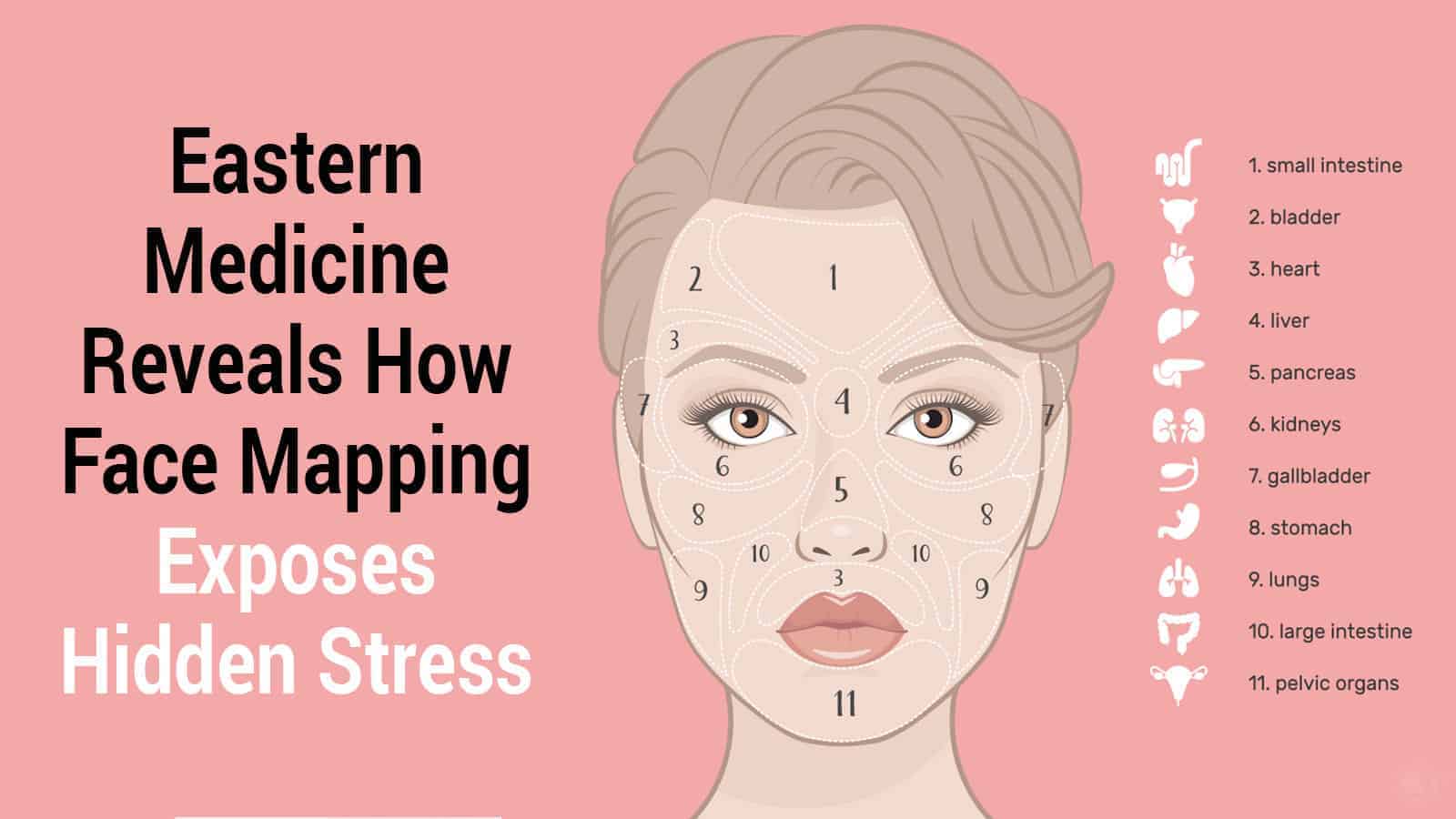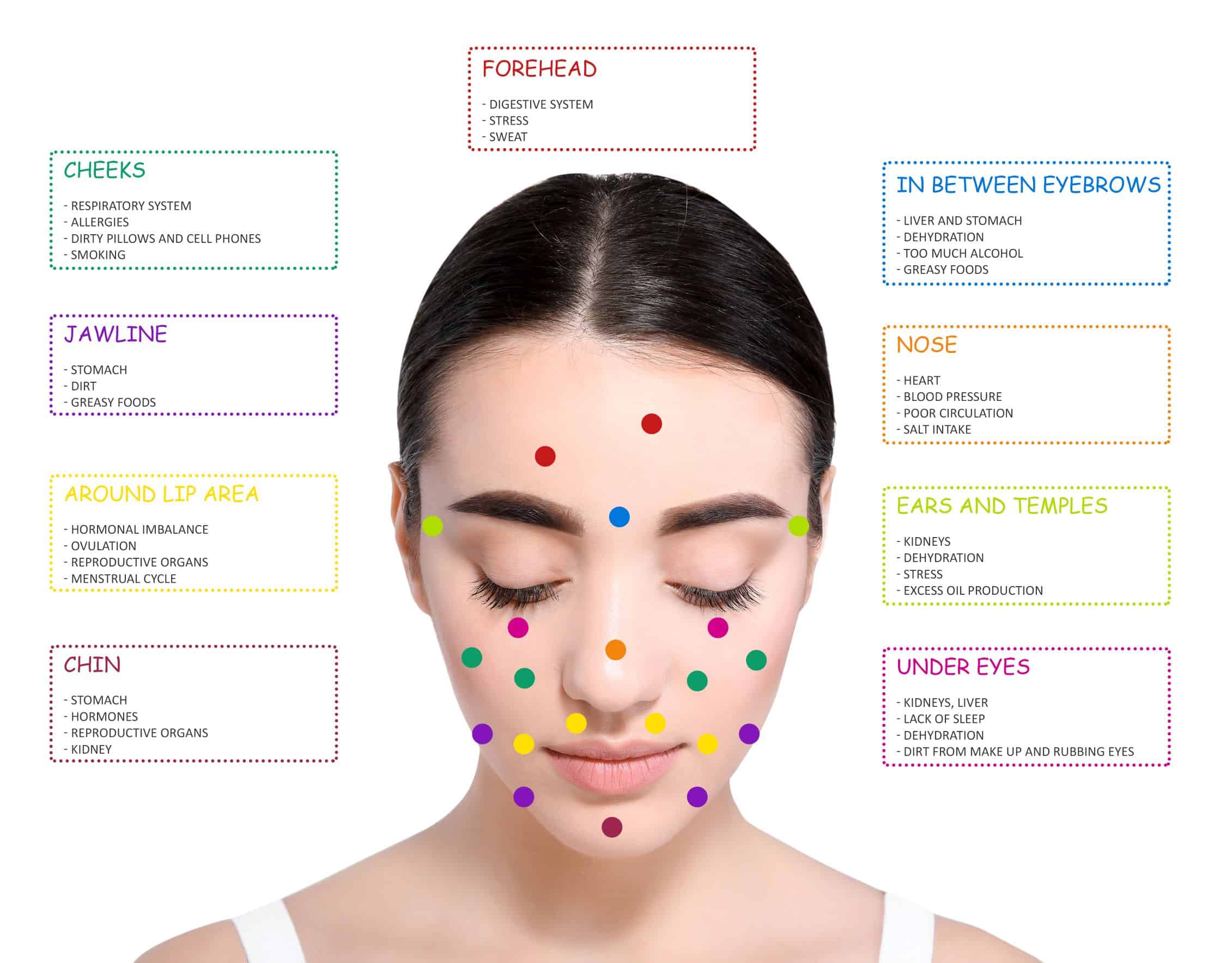Face mapping began in China around 3,000 years ago, and they believe this practice can show one’s inner health, as well as expose hidden stress. Most people deal with occasional skin breakouts and redness and usually turn to skin creams for relief. However, Chinese and Ayurvedic medicine state that skin problems point to underlying health issues, so skin creams just serve as a bandage for the real problem.
Practitioners of face mapping say that each area of the face corresponds to different organs. And that when one goes out of balance, the skin will reflect it. The Chinese believe that an energy force, called qi, or chi, flows to and from organs on invisible pathways in the body. Below, we’ll go over what face mapping can tell you about different aspects of your health, and typical lifestyle habits that sabotage our well-being.
What is face mapping?
First of all, let’s talk a little about what face mapping entails, and how you can use it to analyze your health. Face mapping considers many aspects of what makes up a person’s health, such as allergies, stress levels, hormones, genetics, diet, age, personality, and body type (or dosha, in Ayurveda). Most people seek a face mapping practitioner due to acne, as flare-ups in certain areas mean that specific organs have an imbalance.
However, you can also use face mapping for skin conditions such as redness, wrinkles, rashes from skin allergies, and other facial conditions. While Ayurveda and Chinese medicine have slight differences in face maps, they divide the face into at least ten zones corresponding to various organs.
Here’s how each area of the face corresponds to a different organ, and what that means for your health:
- Pimples on the forehead — governed by the bladder and small intestine, may be tied to unmanaged stress, poor digestion and lack of sleep.
- Breakouts between/above your eyebrows or nose — corresponds to an imbalance in the stomach, kidneys, liver, bladder, or spleen. If you notice acne near your nostrils, it may represent an imbalance of gut bacteria and inflammation in the small intestine.
- Lines or wrinkles near the eyes or between eyebrows — can indicate repressed negative emotions or a poor diet. Represents problems with the liver or spleen
- Breakouts or lines above the eyebrows — correspond to problems with the heart.
- Puffiness under the eyes — poor kidney function, likely due to inadequate water intake
- Acne below the lips and on the jaw — hormone imbalance, problems with the reproductive system, as well as the large intestine, colon, and stomach. If acne forms below the mouth, it could mean an imbalance in the entire digestive tract. For women, especially, it could mean a problem with the hormones.
- Red cheeks — usually mean a blockage in the stomach or respiratory system. May indicate gut bacteria imbalance. Breakouts here point to allergies or sinus problems.
- Red nose — redness or blackheads on the nose may mean heart troubles or high blood pressure.
- Irritation on your neck — points to stress that affects the immune system.
While face mapping is widely used in Eastern cultures to diagnose illnesses and treat stress, there isn’t a whole lot of evidence to back up the claims. Western medicine tends to ascribe to the idea that pimples appear on the face simply because of overactivity in glands that secrete oils. Some doctors believe that redness on the face may indicate hormonal problems or stress.
Modern dermatology lists the following reasons for acne or redness on the face:
- Hormonal imbalances, especially androgen dominance which is known to cause acne
- Elevated stress levels
- Overactive oil glands in the T-zone of the face, which can lead to breakouts
- Lack of quality sleep
- Not washing the face, which allows dead skin and oils to build-up.
- Poor gut health and poor diet in general
- Allergies and immune responses
- Irritation or allergies from skincare and beauty products
- Genetics
- Sunburns
- Lack of circulation
- Diseases such as heart disease or diabetes
- Environmental toxin exposure
Face mapping also addresses many of these issues above, especially stress. However, most dermatologists say that you should look at your daily skincare routine and lifestyle choices to figure out the culprit. Do you clean your face every day with non-toxic facial washes? Use sunscreen while you’re out in the sun? Do you eat a balanced diet and exercise regularly? Get enough sleep?
If you follow a healthy lifestyle and still have breakouts, you should consider making an appointment with a face mapping practitioner or dermatologist for more help. While face mapping doesn’t have much science behind it yet, you shouldn’t rule it out as a possible treatment route. After all, they’ve been using it in Chinese medicine for thousands of years, so there must be something to it.
Face mapping can be compared to acupuncture in that they both use the qi, or meridian system, to diagnose underlying problems. However, most studies show that this system “lacks a physical anatomical basis.”
Differences between Ayurvedic and Chinese face mapping
In traditional Chinese medicine, they focus more on the body’s meridian system, while Ayurveda diagnoses underlying problems based on someone’s body type or dosha.
There are three doshas: Vata, Pitta, and Kapha, and they determine one’s mental constitution as well. Any physical or spiritual imbalances show up in different parts of the body, depending on the dosha.
In Chinese medicine, they believe that any underlying problems will show up on the face. In Ayurveda, they listen to a patient’s issues and give them a specific treatment based on what dosha they determine suffers from an imbalance.
Dermalogica Face Mapping
Dermalogica is a company that offers skin treatment based on a combination of scientific knowledge and Chinese medicine. While they rely on ancient wisdom from Ayurvedic and Chinese face mapping, they mainly treat issues due to sun exposure, inadequate water intake, irritation from skincare products, and hormonal problems.
According to the Dermatologica website, the skin analysis they perform on patients “involves looking at your skin with a trained eye, touching your skin, and asking you questions about your lifestyle and environment.”
Dermalogica gives you a “Personalized Skin Fitness Plan” based on the results you get from your skin analysis as well as solid dermatology advice. They want to identify each patient’s skin goals and get an idea of their lifestyle so they can recommend products and lifestyle adjustments to fit each patient.
Here are some common recommendations made by the consultants at the company:
- Avoiding irritating skin care and perfume products
- Avoid using makeup that clogs pores.
- Preventing sun damage
- Getting adequate water intake
- Addressing stress
- Eating a balanced diet.
- Avoiding foods that cause skin reactions
- Clean your cellphone, pillows, and anything else that touches the face regularly.
The service only takes a few minutes to complete and is done by a qualified representative at Dermalogica. If this interests you, you can look on their website to find a nearby store to get your skin analysis.
In general, doctors and scientists recommend the following to take care of your skin and overall health:
- Watch your intake of high calorie and processed foods.
- Avoid too much salt or sugar in your diet.
- Don’t smoke or drink alcohol.
- Get enough sleep
- Exercise regularly
- Protect your skin when you’re out in the sun
- Keep your mindset positive.
- Get regular checkups with your doctor.
Final thoughts on face mapping and how it can reveal hidden stress
According to Chinese and Ayurvedic medicine, the face can reveal deeper issues with the organs, such as heart disease, diabetes, stress, and other health problems. Redness, acne, wrinkles, or lines on the face mean that the energy flow is imbalanced in the body. Poor functioning of the body’s organs shows up in the skin because the energy needs somewhere to go, and the skin is the largest organ in the body.
Most people use face mapping because of problems with acne, which practitioners believe could point to a kidney or digestive issue. Also, acne on the chin and jaw could represent higher stress levels and hormone imbalances. Dermalogica face mapping is prevalent in many locations, including in salons and spas. If you’d like to get face mapping services, this one only takes a few minutes and is done by a qualified professional.

















 Community
Community

